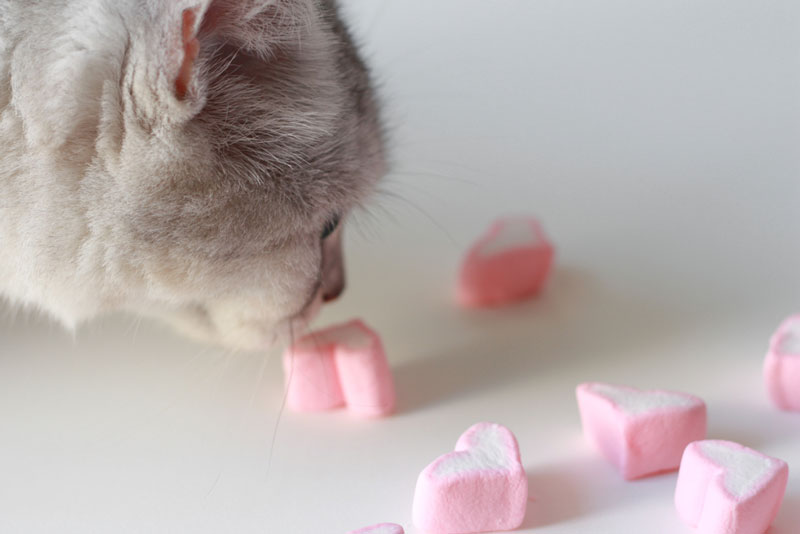Have you ever wondered if your furry feline friend might enjoy a sugary treat like marshmallows? The question of whether cats can eat marshmallows sparks curiosity for many pet owners. The short answer is no, cats should not eat marshmallows. While these fluffy treats are not toxic to cats, they are not healthy for them either. So, let’s explore this topic in more detail!
It’s easy to think that just because a food is safe for humans, it’s also okay for our beloved pets. However, this is far from the truth! Cats have specific dietary needs that differ greatly from ours. This article will help you discover why marshmallows do not belong in your cat’s diet and what we can offer instead. Spoiler alert: it’s not just about avoiding sticky messes!
As we journey through this delightful topic, you will learn about the potential risks of feeding marshmallows to cats, their nutritional needs, and some fun alternatives that will satisfy their cravings without any harmful effects. Stick around—there’s a lot to uncover!
You might also be interested in: Can Cats Eat Whipped Cream?
Can Cats Eat Marshmallows?

When it comes to treats for our cats, we always want to ensure we are making the right choices. Marshmallows are a popular treat among humans, especially during festive occasions. That’s the picky little problem—marshmallows are just not suitable for our cats. Although they are not poisonous, their sugary composition can cause some issues. This soft and fluffy delight is primarily made up of sugar and air, and cats do not need either in their diets.
Being obligate carnivores, cats thrive on a diet rich in animal proteins. Their bodies are not designed to process high amounts of sugar and carbohydrates, typically present in foods like marshmallows. As we consider this, we cannot overlook a cat’s unique body and nutritional needs. Cats have evolved to eat meat, and their digestive systems are structured for that purpose. Thus, we should refrain from introducing them to sugary snacks that can lead to upset stomachs or even a decline in overall health.
How Much Marshmallows Can Cats Eat?
The next question that often arises is how much is too much. In the case of marshmallows, we would advocate for a big fat zero! Cats should not consume any marshmallows whatsoever. Why, you ask? Well, let’s consider what happens when a cat indulges in something it shouldn’t.
Even a small amount of marshmallow has the potential to create digestive discomfort for our precious fur babies. Most commonly, cats may experience gastrointestinal upset, such as vomiting or diarrhea. The sugar in marshmallows can disturb a cat’s tummy, leading to dehydration— a concerning situation to be in.
As responsible pet owners, we need to monitor our furry friends’ diet closely. Treating them with human food can easily spiral into giving them too much. Controlling what they consume not only keeps them safe but also builds a loving environment where we make decisions in their best interests. So, let’s skip the marshmallows entirely and consider safer treats.
Benefits Of Marshmallows To Cats
1. In terms of benefits, let’s focus on the positives of not giving marshmallows. By avoiding sugary snacks meant for humans, we can help our cats maintain a healthy weight and avoid obesity related complications. Keeping our cats lean and fit helps improve their overall well-being.
2. Feeding cats a protein-rich diet enhances their energy levels and keeps them active. This quality food promotes a shiny coat and healthy skin, making them more vibrant and happy companions. Think of it this way: a healthy cat is a happy cat!
3. Good quality food can also support dental health. Crunchy kibble can help reduce tartar buildup, while too many sugary treats can encourage plaque formation. Just like us, cats need oral care to avoid nasty dental diseases in their adorable little mouths.
4. Choosing the right treats can strengthen the bond between you and your feline friend. When we give them treats specifically made for them, we show that we care about their health and happiness. It keeps our pets happy and encourages trust in our loving relationship.
5. Healthy treats can serve as tools for training or behavior reinforcement. For example, if we want to teach our cats how to respond to commands or tricks, positive reinforcement with healthy treats can be effective. It’s a win-win situation!
Dangers Of Feeding Marshmallows To Cats
So, what are the risks and dangers of feeding marshmallows to cats? Well, there are several factors to consider here. Firstly, sugar is a main ingredient, and we already know that sugar doesn’t play nice with your cat’s tummy. Too much sugar can lead to obesity, diabetes, and other serious health issues.
Unlike humans, cats lack the taste receptors for sweetness, meaning they might not even enjoy the flavor. So, what’s the point of feeding them something that they don’t truly want? This leads to a waste of resources and doesn’t serve any beneficial purpose for our furry friends.
Additionally, marshmallows can pose a choking hazard if your cat tries to gobble them down. With their soft texture, they could easily get lodged in their throat or digestive tract. Is it worth the risk? Definitely not!
To summarize, the risks far outweigh any negligible benefits. We love our furry friends too much to put them in harm’s way. Instead, let’s be on the lookout for the right treats and ensure they get nutritious rewards.
Substitute Of Marshmallows For Cats
1. Cooked Chicken or Turkey: Instead of marshmallows, we can explore healthy snack options like cooked chicken or turkey pieces. These are protein-packed and are sure to make your cat purr with joy! Think of how their eyes will light up when they see you prepare a meat treat!
2. Catnip: Another great alternative is catnip. Cats adore it! Not only does it provide mental stimulation, but it also offers an avenue for playful behavior. Sprinkle some on their scratching post or in their toys for added fun!
3. Freeze-dried Meat Snacks: Consider freeze-dried meat snacks. These treats maintain all the nutrients found in fresh meat and are irresistible to our cats! You get the bonus of a shelf-stable treat that you can offer without worries!
4. Carrots or Green Beans: This can also be healthy additions to your cat’s diet. Some cats enjoy munching on crunchy veggies! Just remember to introduce these foods slowly so their little tummies can adjust.
5. Specifically Formulated Treats: Lastly, you might explore specially designed cat treats available in pet stores. Choosing treats that are specifically formulated for our cats’ needs can provide both taste and nutritional value. Every time you buy them, you are investing in their happiness!
Can Cats Eat Marshmallows? Frequently Asked Questions
Can Cats Have Sugar?
While some cats can tolerate a small amount of sugar, it is generally best to avoid it. Cats do not require sugar in their diet, and too much can strain their health significantly.
What Are Some Healthy Treat Options For My Cat?
Some healthy treats include cooked meats, freeze-dried snacks, and specific cat treats designed for their dietary needs.
What Signs Should I Look For If My Cat Ate Something They Shouldn’t?
If your cat exhibits signs like vomiting, diarrhea, or lethargy, it’s essential to monitor them and consult a veterinarian if symptoms persist.
Can My Cat Have Fruits And Vegetables?
Some fruits and veggies are safe for cats, such as small amounts of carrots or blueberries, but they should be introduced slowly and in moderation.
Is There Anything I Should Completely Avoid Giving My Cat?
Yes! Certain foods like chocolate, onions, garlic, and grapes are harmful to cats and should always be avoided.
Final Thoughts
In conclusion, while we can enjoy marshmallows ourselves, these sugary treats are best left out of our cats’ diets. Understanding their dietary needs allows us to make better choices, ensuring they stay healthy and happy. By opting for nutritious alternatives and being mindful of what we feed them, we strengthen our bond with our feline friends.
So, when you’re tempted to share your marshmallows with your pets, think twice! Your cat will thank you for it in a million cuddles and purrs. If you’re interested in exploring more about what cats can and cannot eat, feel free to check out our other informative articles such as Can Cats Eat Chocolate. Happy feeding!


